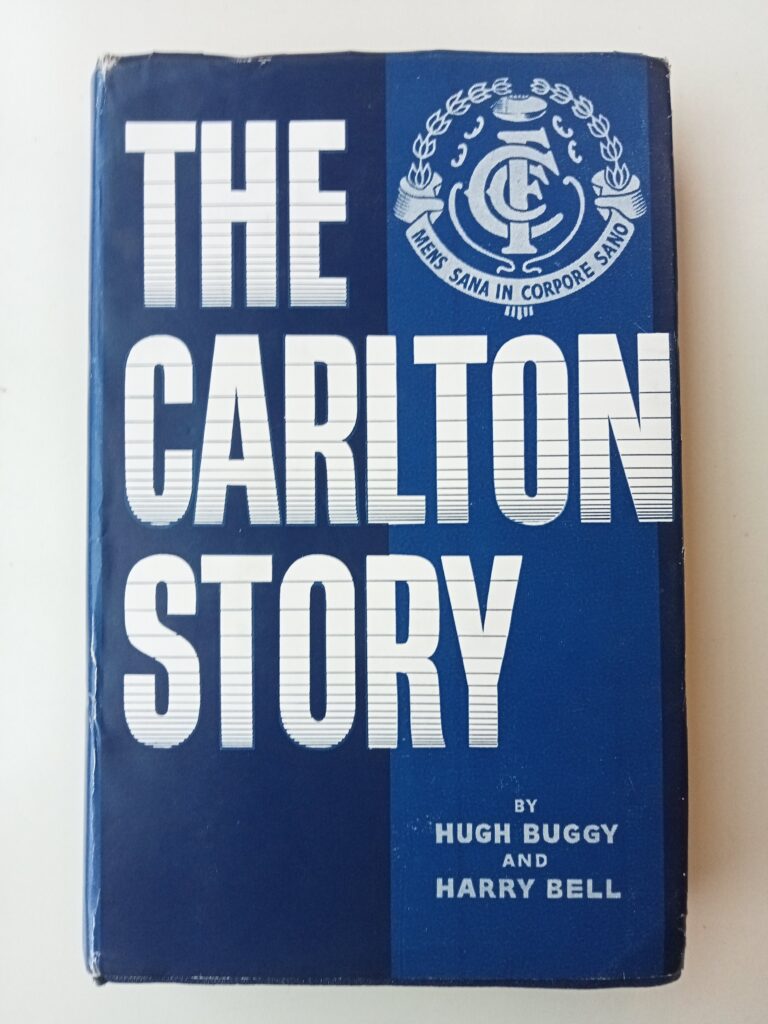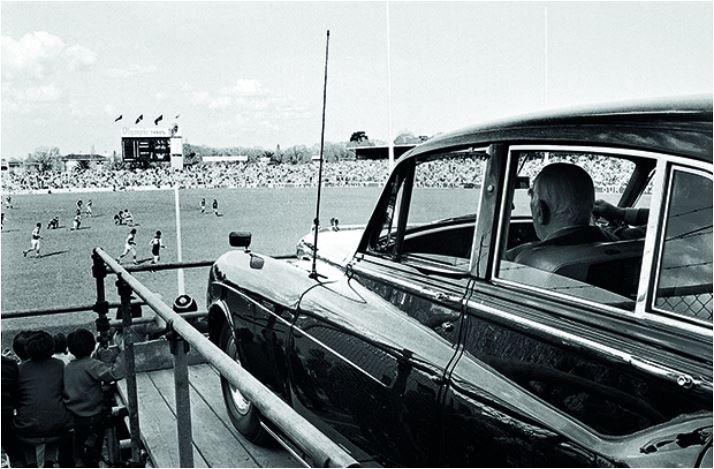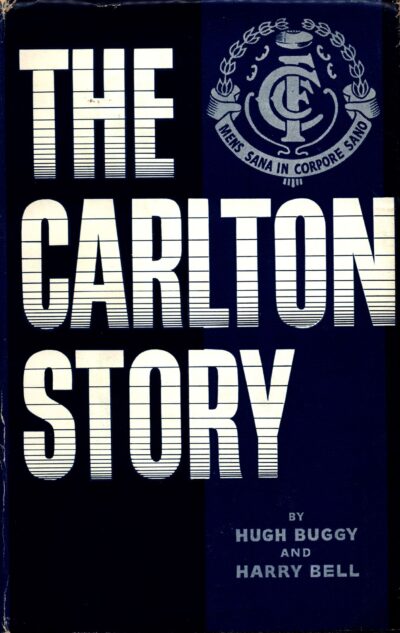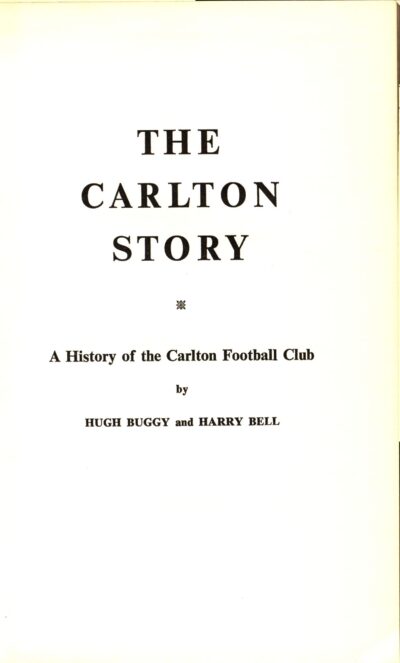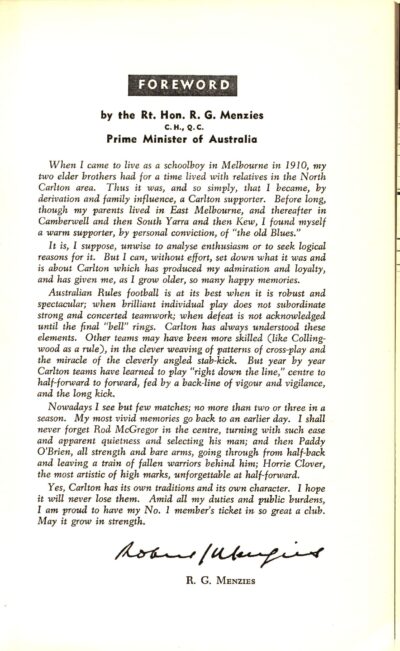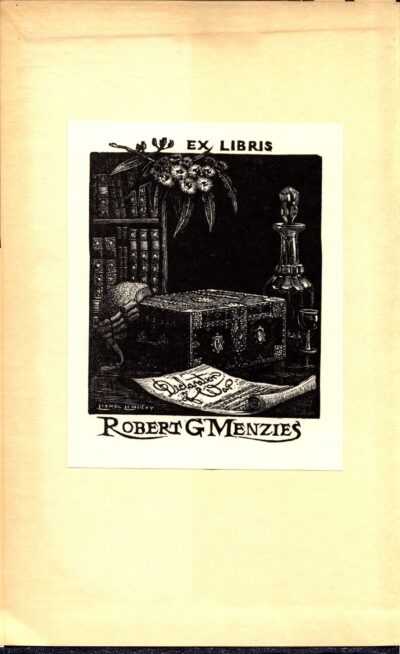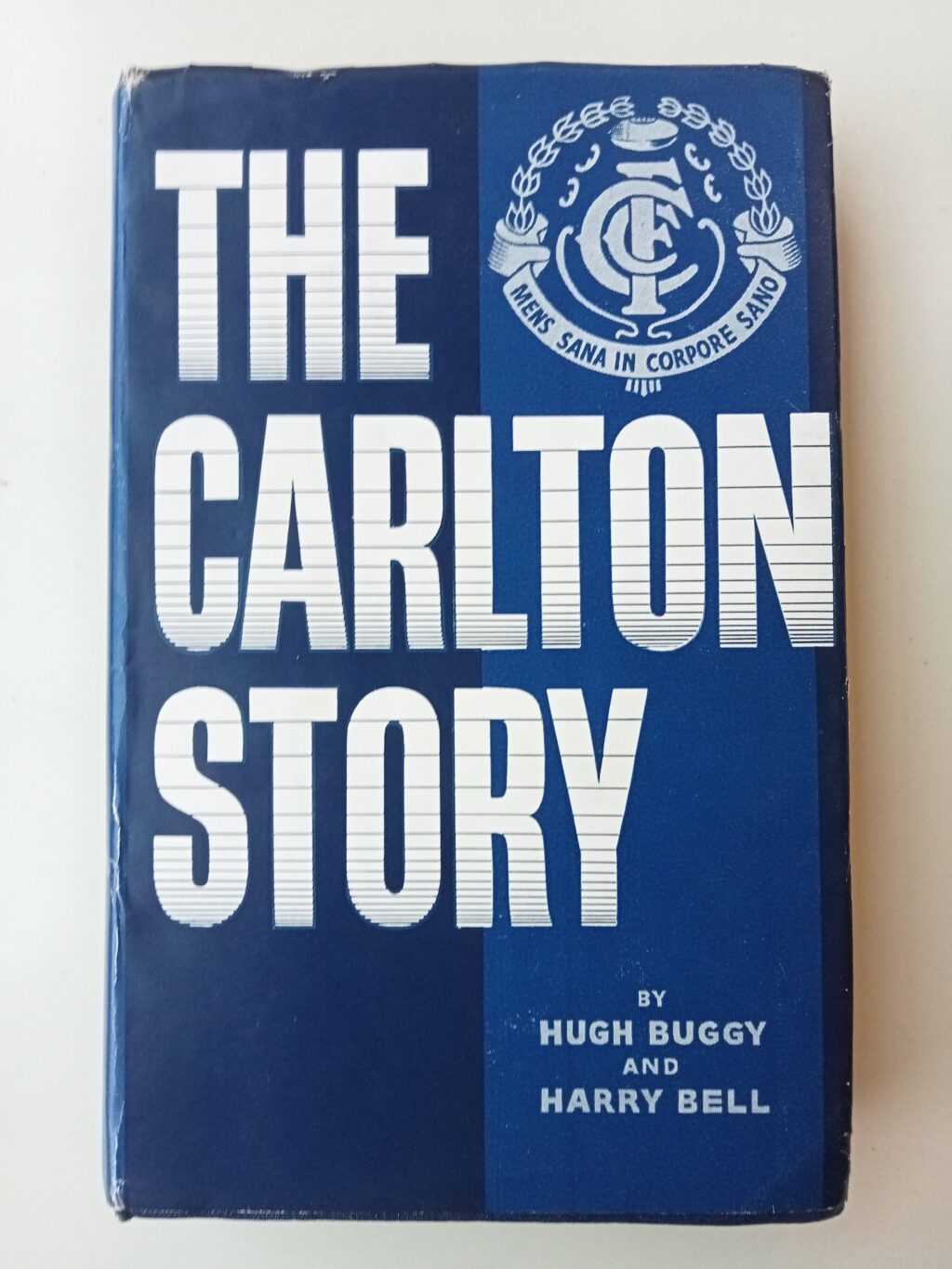Hugh Buggy & Harry Bell, The Carlton Story: A History of the Carlton Football Club (1958)
Hugh Buggy was a long-time journalist, whose talent for reporting on major crimes and other events was matched by a penchant for sports reporting. Born in Seymour Victoria in 1896, his first gig was working for the South Melbourne Record before he graduated to the Melbourne Argus in 1917. Over his career Buggy would report on more than 200 murder investigations, 83 murder trials, and attend nine hangings, while he also worked as chief operational censor at General Douglas Macarthur’s headquarters between 1942-46. Buggy had a phenomenal memory, and even in his last years he was able to recall all VFL grand final scores, as well as the results (with innings totals) of all Australia-England Test cricket matches. He is perhaps best remembered for allegedly coining the term ‘bodyline’ which described England’s controversial tactics during their 1932-33 Ashes tour of Australia, though the true origins of the term are difficult to verify.
Buggy spent much of his life living in McIlwraith Street, Carlton with his mother and aunt, and given his talent for vividly describing sporting accomplishments he was a natural fit to write A History of the Carlton Football Club. Menzies wrote the foreword, as coincidently he did with E.C.H. Taylor’s 100 Years of Football: The Story of the Melbourne Football Club 1858-1958 published the same year.
Menzies’s first sporting passion was undoubtedly cricket, and the Menzies Collection contains vastly more cricket books than football books. Nevertheless, as a proud Victorian Menzies was naturally a fan of Australian Rules and he was a highly passionate supporter of Carlton. Famously, in Menzies’s retirement he had a special ramp installed at the Carlton ground which allowed him to watch their games from his Bentley even as his health failed.
Menzies’s foreword tells how he came to support the club:
‘When I came to live as a schoolboy in Melbourne in 1910, my two elder brothers had for a time lived with relatives in the North Carlton area. Thus it was, and so simply, that I became, by derivation and family influence, a Carlton supporter. Before long, though my parents lived in East Melbourne, and thereafter in Camberwell and then South Yarra and then Kew, I found myself a warm supporter, by personal conviction, of “the old Blues.”
It is, I suppose, unwise to analyse enthusiasm or to seek logical reasons for it. But I can, without effort, set down what it was and is about Carlton which has produced my admiration and loyalty, and has given me, as I grow older, so many happy memories.
Australian Rules Football is at its best when it is robust and spectacular; when brilliant individual play does not subordinate strong and concerted teamwork; when defeat is not acknowledged until the final “bell” rings. Carlton has always understood these elements. Other teams may be more skilled (like Collingwood as a rule), in the clever weaving of patterns of cross-play and the miracle of the cleverly angled stab-kick. But year by year Carlton teams have learned to play “right down the line”, centre to half-forward to forward, fed by a back-line of vigour and vigilance, and the long kick.
Nowadays I see but few matches; no more than two or three in a season. My most vivid memories go back to an earlier day. I shall never forget Rod McGregor in the centre, turning with such ease and apparent quietness and selecting his man; and then Paddy O’Brien, all strength and bare arms, going through from half-back and leaving a train of fallen warriors behind him; Horrie Clover, the most artistic of high marks, unforgettable at half-forward.
Yes, Carlton has its own attractions and its own character. I hope it will never lose them. Amid all my duties and public burdens, I am proud to have my No. 1 member’s ticket in so great a club. May it grow in strength.’
In 1952 Buggy captured Menzies’s passion for the club, reporting in the Argus:
‘[Menzies] makes no insincere pretence that he is interested in football in an academic way. He is an indefatigable supporter of Carlton, and he doesn’t give two hoots who knows it. He goes to the football to see the Blues win.
For two emancipated hours that full throated bellow “Bowl ’em over Blues” is music to Mr. Menzies. He enjoys every minute of it.
For two hours he puts behind him all the problems and pother of politics. “Chook” Howell and Ollie Grieve and what they’re doing are far more vital to the Prime Minister than what Dr. Evatt and members of the Opposition are saying or doing.
I was close to Mr. Menzies in the 62,000 crowd that watched one of the roughest grand finals of all time between Carlton and South Melbourne, at Carlton oval, in 1945. I studied his reactions to the slugging and to the play whenever players forgot their feuds and really played.
Mr. Menzies was then Leader of the Opposition, and he was in the “outer,” where rain pattered steadily on his black Homburg. He began tense and pale as Carlton battled against solid opposition for that first break that is so important in a grand final. It was a long time coming, and “R.G.” clenched and unclenched his hands, wiped his rain-wet face with a handkerchief, and swayed with the rocking crowd.
He was quiet but obviously tensed up until a South player felled Carlton’s Ken Hands with a vicious upper cut.
Then we saw a new Mr. Menzies. His face flushed crimson. He stamped his foot. All his reserve vanished.
“That was atrocious” he yelled across the inclined plane of hats, “absolutely atrocious. That man should be rubbed out for life.”
“You’re quite right, Bob,” shouted one solid Carlton supporter near him. “I agree with you for once, Bob. It was bloody murder. C’mon the Blues. Fling yer weight into these mugs.”
Gradually Carlton got the upper hand. Mr. Menzies was able to relax, and he cheered wildly with the rest as the Blues fought to their seventh League pennant.
His loyalty to Carlton Football Club has never waned since his University days. Somewhere about 1947, Mr. Menzies went down to Collingwood Town Hall to speak in support of a Liberal candidate in that stronghold of Labor. It was midwinter, and the football frenzy was upon us.
“I’ll give you a good tip.” Mr. Menzies added to a hostile audience. “The Liberals will win the election.”
They merely guffawed in a good humoured way.
“Then my second tip.” Mr. Menzies added, “is that Carlton will win the Premiership.”
A blast of hooting swept up the hall and crashed around the stage. This was over the odds – rank heresy, treason, disloyalty in the nest of the Magpies.
But taking a long view of it, it wasn’t bad tactics; no politician likes an apathetic audience.’
You might also like...
Sign up to our newsletter
Sign up for our monthly newsletter to hear the latest news and receive information about upcoming events.

